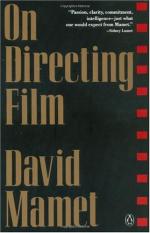
|
| Name: _________________________ | Period: ___________________ |
This test consists of 15 multiple choice questions and 5 short answer questions.
Multiple Choice Questions
1. Eisenstein claimed that the best image is a what image?
(a) Uninflected.
(b) Inflected.
(c) Articulate.
(d) Unattached.
2. What is the term which means "it works correctly on paper but for some reason doesn't work when we get it on its feet"?
(a) The Rule of Circularity.
(b) The K.I.S.S. Rule.
(c) The Jesus Factor.
(d) The Hippo Factor.
3. The first beat in the hypothetical scene of Chapter 2 was to what?
(a) To prepare.
(b) To arrive early.
(c) To gain respect.
(d) To pay homage.
4. Mamet says in Chapter 1 that if the film follows the protagonist around, what he does had better be what?
(a) Heroic.
(b) Active.
(c) Interesting.
(d) Narrating.
5. Chapter 1 deals with what element of the process of directing?
(a) Narration.
(b) Characterization.
(c) Structure.
(d) Storytelling.
6. According to Mamet, what was his response to "lovely enthusiasts who will aver that the purpose of modern art is not to be liked"?
(a) "Get a life."
(b) "Let's get it over with."
(c) "Oh, grow up."
(d) "Learn a craft."
7. What does Mamet say most modern art is based around?
(a) Poetry.
(b) Self-indulgence.
(c) Political reasons.
(d) Creativity.
8. Who did Mamet cite in saying that we needn't avoid things just because they're cliche?
(a) Aristotle.
(b) Hemingway.
(c) Stanislavsky.
(d) Eisenstein.
9. All the audience cares about is the what, according to Mamet?
(a) Objective.
(b) Narration.
(c) Thrust of the scene.
(d) Protagonist.
10. What is the term for the thing which stands in the way of the protagonist?
(a) Conflict.
(b) Action.
(c) Objective.
(d) Obstacle.
11. What logical construct did Mamet use to explain the system of film-making in Chapter 3?
(a) N plus R is P.
(b) A plus B is C.
(c) If A, then C.
(d) If A, then B.
12. In the scene generated for the class in Chapter 2, what did the protagonist want?
(a) The students' respect.
(b) To sell a pig.
(c) Money.
(d) The teacher's respect.
13. Who wrote Memories, Dream, Reflections?
(a) Bruno Bettelheim.
(b) Sigmund Freud.
(c) Carl Jung.
(d) Constantin Stanislavsky.
14. Mamet says that you cannot hide your what, in Chapter 3?
(a) Action.
(b) Objective.
(c) Structure.
(d) Outline.
15. In what year did Mamet write the Preface of the book?
(a) 1990.
(b) 1985.
(c) 1988.
(d) 1995.
Short Answer Questions
1. A film is basically what, according to Mamet?
2. The smallest unit is the shot; the largest unit is what?
3. Mamet says in Chapter 3 that it is the nature of human perception to go to what?
4. Whose method relies on a succession of images juxtaposed so that the contrast moves the story forward?
5. Who directed the film Places in the Heart?
|
This section contains 417 words (approx. 2 pages at 300 words per page) |

|




